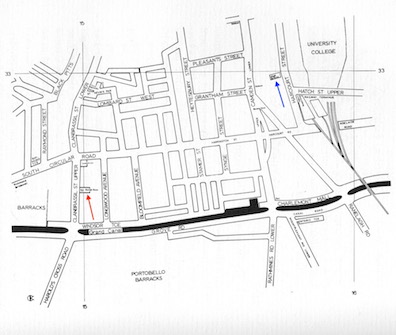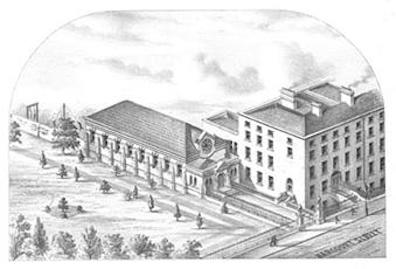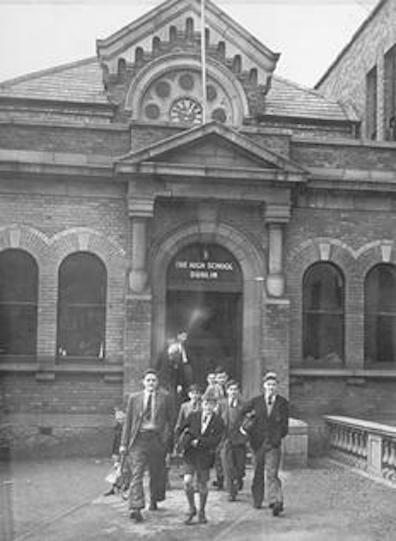The "high school," "High school," or "High School" that Bloom
attended as a teenager was the Erasmus Smith High School, a
fee-paying Protestant institution sponsored by the Church of Ireland, known
then and now simply as The High School. Today it is
co-educational and located in Rathgar, but in 1904 it was a
boys' school on Harcourt Street in south central Dublin, not
very far from the house that Bloom grew up in.
Oxen of the Sun recalls the teenage Bloom,
"precociously manly, walking on a nipping morning from the
old house in Clanbrassil street to the high school, his
booksatchel on him bandolierwise, and in it a goodly hunk of
wheaten loaf, a mother’s thought." The walk from Clanbrassil
Street to the school was less than a mile, perhaps about one
kilometer.
Founded in 1870 by the Erasmus Smith Trust (Smith was a 17th
century English merchant who practiced educational
philanthropy), The High School originally sought to prepare
boys for careers in business. In Lotus Eaters, though,
Bloom thinks of the science he studied with Mr. Vance as
part of "The college curriculum." Gifford observes that
"High schools in the national school system were primarily
vocational in their emphasis, but the possibility of a
'college curriculum' (i.e., college preparatory course) was
enhanced in 1878 (when Bloom was twelve) by the establishment
of a Board of Intermediate Education, which held annual
examinations and distributed subsidies to secondary schools
according to the results."
Bloom did not go on to college, however. The same passage in
Oxen remembers him "a year or so gone over, in his
first hard hat (ah, that was a day!), already on the road, a
fullfledged traveller for the family firm, equipped with an
orderbook." Bloom was born in the spring of 1866, and Ithaca
refers to "his ultimate year at High School (1880)."
If young Bloom went into the family business immediately after
graduating, this would make him only 14 years old. But the
novel seems conflicted on this point. In Circe, as
Bloom celebrates the "Halcyon days" with five classmates, he
exclaims, "Again! I feel sixteen! What a lark! Let’s
ring all the bells in Montague street. (He cheers feebly.)
Hurray for the High School!"
The novel memorializes several defining experiences in
Bloom's years at The High School. Circe makes infamous
a class "excursion" or field trip to the Poulaphouca
waterfall, when Bloom may have wandered off from his
classmates and masturbated in the woods. It also suggests that
his affinity for imagining himself a woman dates to his
performance as a "female impersonator" in a school production
of the play Vice Versa.
With a wonderful feeling for the mixture of adult
intellectual growth and childish physical simplicity that
characterizes the secondary school years, Ithaca notes
Bloom's superlative "execution of the half lever movement on
the parallel bars in consequence of his abnormally developed
abdominal muscles," his ability to project the highest stream
of urine "against the whole concurrent strength of the
institution, 210 scholars," and his declaration to Percy
Apjohn of "his disbelief in the tenets of the Irish
(protestant) church (to which his father Rudolf Virag (later
Rudolph Bloom) had been converted from the Israelitic faith
and communion in 1865 by the Society for promoting
Christianity among the jews)." This was of course the very
church that ran the school, though The High School has a
tradition of tolerating many faiths and even lack of faith.
The school also figures in Nausicaa, when Gerty
thinks that Reggie Wylie "was going to go to Trinity college
to study for a doctor when he left the high school like his
brother W. E. Wylie who was racing in the bicycle races in
Trinity college university." In the lives of the Protestant,
upwardly mobile Wylies we glimpse a very different trajectory
from that of Bloom.


